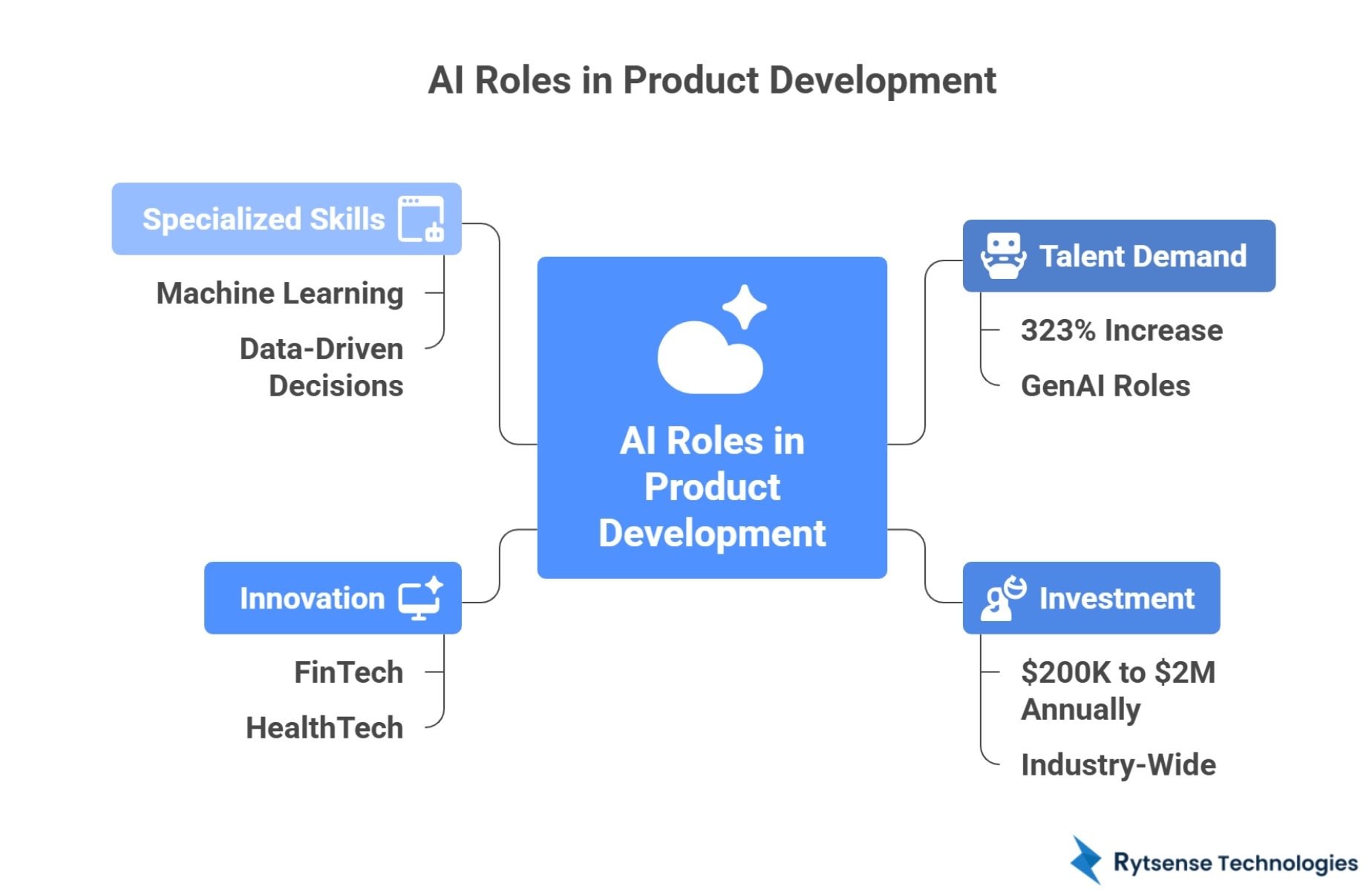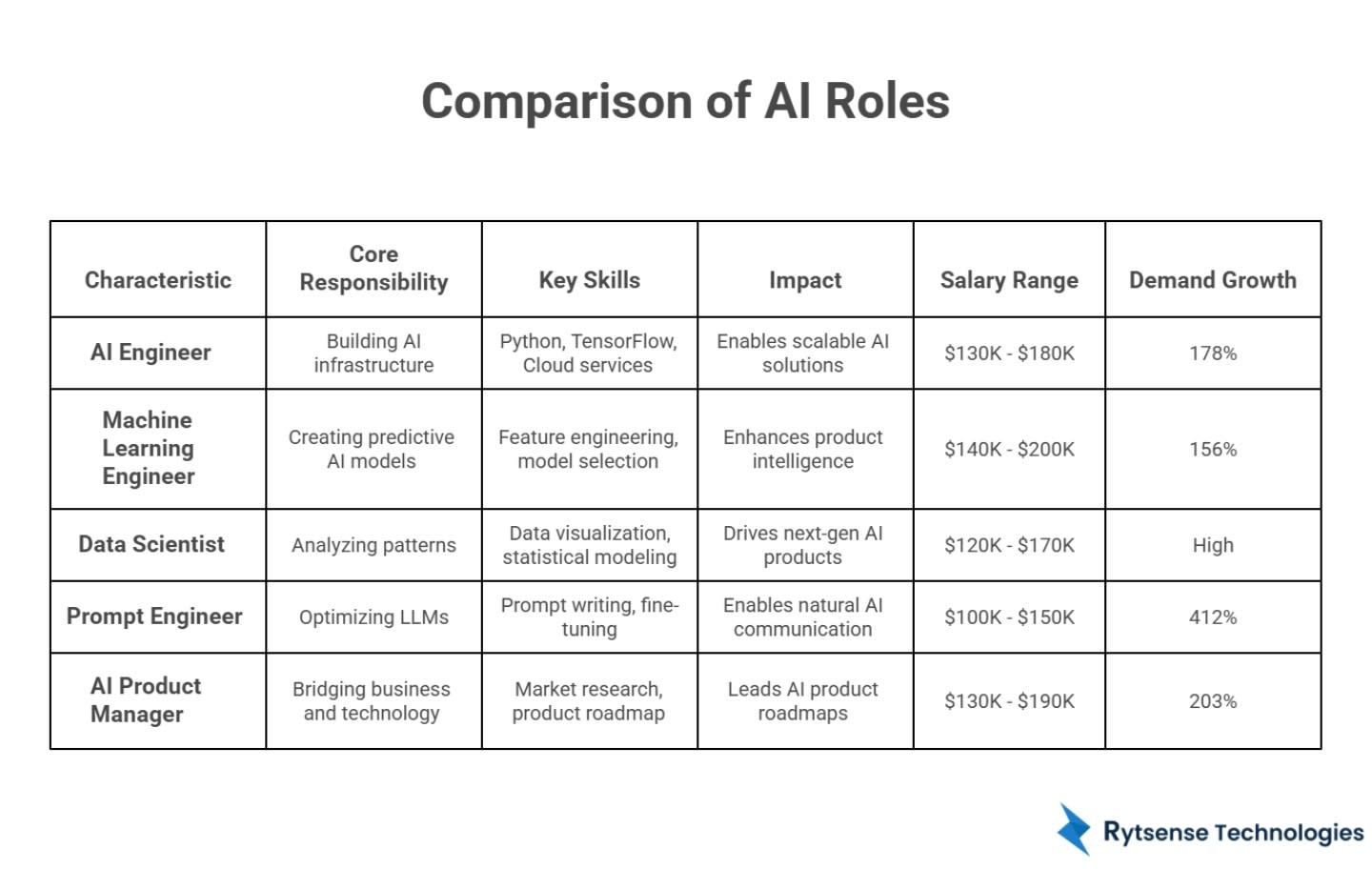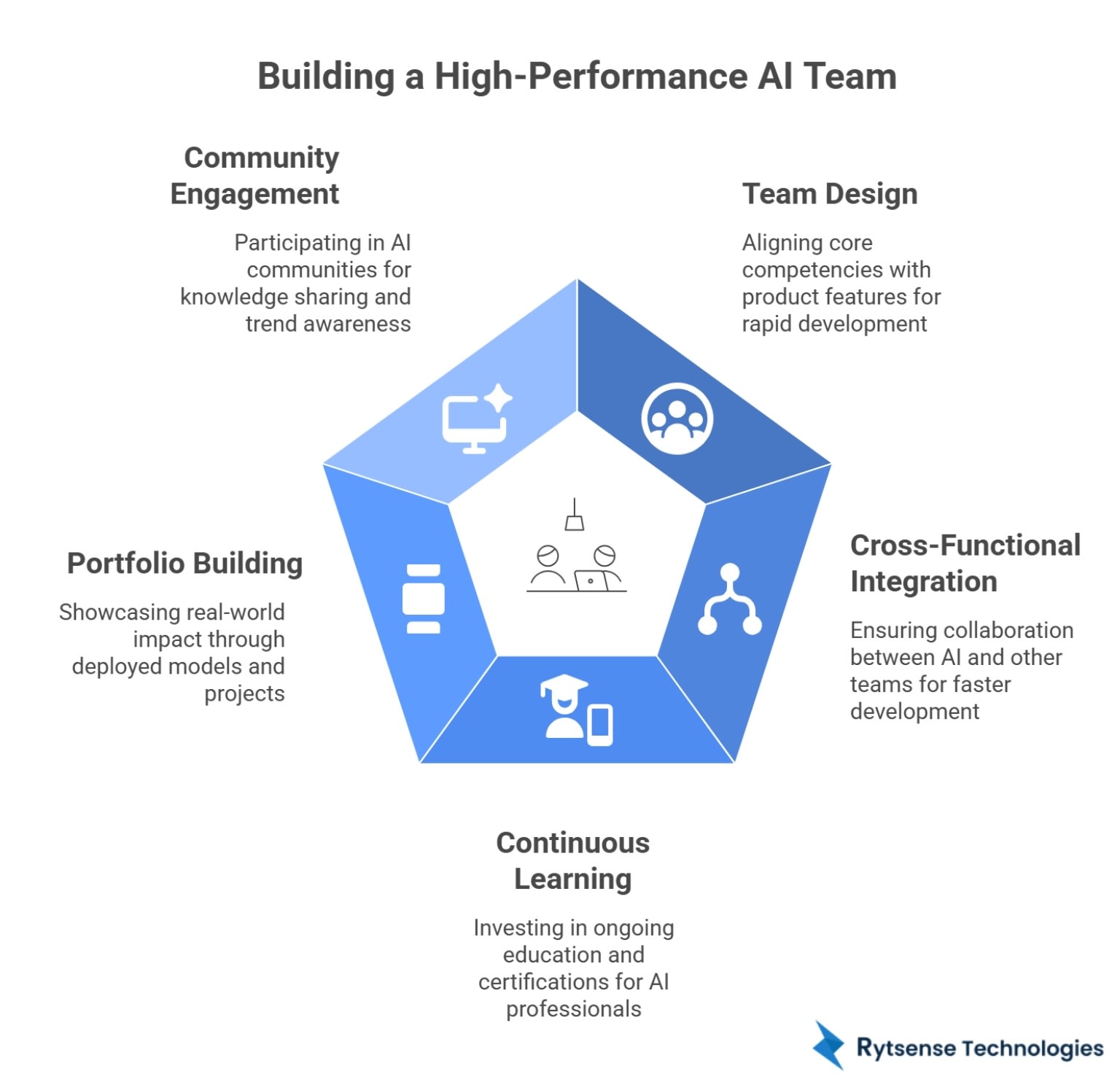5 AI Roles You Need for Your Next-Gen Product
The demand for every AI role has surged as companies race to build next-gen, intelligent products in 2025. With GenAI adoption exceeding 65%, organizations are investing up to $2M annually to hire specialized experts like AI engineers, ML engineers, data scientists, prompt engineers, and AI product managers. These roles drive innovation, scalability, and automation in product development. Building cross-functional, well-aligned AI teams helps accelerate innovation, ensuring businesses stay competitive in the era of AI-powered transformation.
Introduction: Why AI Roles Are Essential for Next-Gen Products
AI is transforming product development processes with a 323% talent request increase, as brands are hiring AI talent to build products in ways that workflow and generic technology teams do not have the understanding and/or capacity to handle complex AI-powered intelligent systems and GenAI features. Companies are now investing between $200K to $2 million annually in specialized AI roles.
How AI is redefining innovation and product development
The landscape of AI roles is rapidly changing. Recent reports from industry sources indicate that there has been a 323% rise in demand across the AI talent pool, with GenAI roles leading the pack. Companies from all industries are spending a range of $200K to $2M per year just to hire AI talent as they start to deploy intelligent capabilities in their products. AI has changed the game in innovation/product development across every sector—from FinTech to HealthTech.

The growing need for specialized AI roles
Twenty-first-century AI product development requires specialized talent. Generic software engineering teams cannot effectively manage the data and complexity of machine-learning pipelines, large language models, and data-driven decision systems. The need for specialized AI roles has increased due to the complexity of AI systems. Each AI role has its own unique skill set that traditional developers do not possess.
What’s Driving the Demand for AI Talent in 2025
Three forces are changing how organizations will hire AI talent:
(1) GenAI adoption is now staring at 65% of organizations
(2) AI-powered business and product ecosystems are replacing traditional product features
(3) AI-enabled features are a critical competitive differentiator for fast-scaling startups and mid-sized companies.
Three Factors Increasing Demand for AI Talent in 2025
Rapid adoption of GenAI and automation tools
The adoption of GenAI has been explosive. Over 65% of medium-sized technology companies currently use generative AI in production, in whole or in part. As a result, there is a great demand for Generative AI roles such as prompt engineers or large language model specialists. Companies are seeking professionals who understand transformer architectures, fine-tuning, and prompt optimization.
The rise of AI-powered business ecosystems
AI is beyond merely a feature; it's a foundation. AI development teams are now building entire ecosystems around intelligent automation. From customer service bots to predictive analytics dashboards, AI permeates every product layer. This requires them to have a variety of roles in the AI teams working together in sync.
AI as a competitive differentiator
Companies without AI will soon fall behind. Fast-growing startups (50-500 employees) know the right set of AI roles and responsibilities is the difference between success and failure in the market. CTOs with a product development champion know (or are starting to realize) that they need to assemble AI development teams that are capable of delivering next-gen features in a timely fashion.
Also Read:
Top 8 Use Cases of AI Chatbots in BusinessThe 5 Most In-Demand AI Roles You Need
Five roles are essential for AI-powered products:
(1) AI Engineers, responsible for building the AI infrastructure;
(2) Machine Learning Engineers, responsible for creating the predictive AI models;
(3) Data Scientists, responsible for analyzing patterns;
(4) Prompt Engineers are responsible for optimizing and updating their LLMs; and
(5) AI Product Managers who speak both business and technology language, and are responsible for creating the incentives for your business to accelerate and obtain meaningful value.

1. AI Engineer
Essentially, AI engineers build the architecture of intelligent products. Their work involves designing the AI systems, integrating the API's, deploying models, and maintaining production pipelines. AI engineers typically leverage programming and tooling like Python, TensorFlow, PyTorch, cloud services (AWS, GCP, Azure), and MLOps tools.
AI engineer roles focus on:
- Architecting and building scalable AI solutions
- Implementing an architecture for model serving
- Optimizing the speed and cost of inference
- Building data pipelines for training AI models
- Ensuring the security of AI systems
Why every AI-driven product needs one
Without AI engineers, your AI development team suffers from a lack of technical leadership. AI engineers are needed to bridge the gap from research-type models to enterprise-grade production systems. The average salary for AI engineers ranges from $130K - $180K. The demand in 2024 for AI engineer roles increased by 178%.
| Skill Category | Required Expertise | Tools/Technologies |
|---|---|---|
| Programming | Python, Java, C++ | TensorFlow, PyTorch, Scikit-learn |
| Cloud & DevOps | Container orchestration, CI/CD | Docker, Kubernetes, Jenkins |
| Model Deployment | API design, microservices | FastAPI, Flask, REST APIs |
2. Machine Learning Engineer
Building and optimizing predictive models
Machine learning engineers are responsible for developing algorithms to learn from data. They create recommendation engines, fraud detection models, and predictive maintenance applications. Their work involves feature engineering, model selection, hyperparameter tuning, and A/B testing.
Key responsibilities include:
- Training custom ML models
- Evaluating metrics for model performance
- Applying ensemble methods
- Testing experiments and backtesting
- Monitoring models and ensuring performance over time
Their role in enhancing product intelligence
Machine learning engineers make products smarter. They enable personalization, automation, and intelligent decision-making. GenAI roles tend to overlap in this area since users are also working with foundation models. Compensation ranges: $140K-$200, and job postings were up 156% year-over-year.
3. Data Scientist
Turning data into actionable insights
Data scientists are the strategists of the AI-development team. They mine data for patterns, create statistical models, and communicate what they have found to stakeholders. They work with structured and unstructured data to solve business problems.
Key AI roles and responsibilities include:
- Exploratory data analysis
- Hypothesis testing and validation
- Building classification and regression models
- Data visualization
- Collaborating with product managers
How data science drives next-gen AI products
Data scientists identify opportunities for the AI development of products. They discover what problems AI can and cannot solve. They determine which issues AI can address and which can’t. They provide the analytical framework for every job in the AI team. Pay ranges from $120K and $170K. Demand is still very high in all industries.
| Activity | Purpose | Business Impact |
|---|---|---|
| Data Exploration | Understand patterns and anomalies | Identifies product opportunities |
| Model Building | Create predictive algorithms | Enables intelligent features |
| Performance Analysis | Measure model accuracy | Ensures reliability |
4. Prompt Engineer / NLP Expert
Crafting effective prompts for LLMs and chatbots
Prompt engineers are among the very newest GenAI roles. They create input that results in quality relevant outputs in large language models. This role emerged as companies started adopting GPT, Claude, and other models like it.
Responsibilities include:
- Writing and testing prompts
- Fine-tuning language models
- Building RAG (Retrieval-Augmented Generation)
- Optimizing tokens and costs
- Ensuring responses are of quality and safe
Enabling natural and accurate AI communication
NLP experts are the people who enable AI to understand human language. They work on sentiment analysis, branding recognition, and conversation design. Generative AI-focused roles, such as prompt engineers, have become indispensable to chatbots,virtual assistants, and tools for generating content. Pay ranges from $100K to $150K. Demand has risen 412% since early 2023.
5. AI Product Manager
Bridging business strategy with AI capabilities
AI product managers convert business ambitions into technical specifications. They possess a deep understanding of the limitations and capabilities of the AI solution they are delivering. They prioritize features, manage the backlog, and act as a liaison between stakeholders and technical teams.
Core Functions:
- Define the AI product roadmap
- Conduct market research
- Determine criteria for success
- Lead cross-functional teams
- Evaluate AI tools and vendors
Leading AI product roadmaps from concept to launch
This AI role guarantees that your AI development team spends its time building useful products for users. The role requires balancing innovation and AI limitations vs. feasibility. They know the various AI team roles and lead them to collaboration as a group. The average compensation is between $130K - $190, and in 2024, hiring in this area increased by 203%.
Want to Build a High-Performance AI Team Fast?
Get expert-vetted AI engineers, ML developers, and data scientists tailored to your product needs.
Building a High-Performance AI Team
When designing your team practice, it is essential to have the core competencies aligned with the product features. Integrating the Practitioners, Engineers, and Product teams as you develop features across OpCo encourages rapid development and risk pack thinking. Start small, develop the plan, and gauge risks and scale as you go. Ensure you have cross-functional workflows.
How to align roles for scalability and collaboration
A successful AI product is the result of careful strategy in team design. Start your team with core AI roles: one AI engineer, one data scientist, and one ML engineer. As you scale your organization, include GenAI roles. At the level of CTO, AI roles and responsibilities should be mapped to specific product features.
Collaboration framework:
- Data scientists surface possibilities
- ML engineers build models
- AI engineers deploy systems
- Prompt engineers optimize user-facing interaction with LLM
- An AI product manager coordinates delivery
Importance of cross-functional AI integration
Cross-functional integration is vital for your AI development team to collaborate with your established product, design, and engineering teams. AI teams that are siloed fail. When cross-functional teams collaborate on AI, you dramatically speed up the development of AI products. Use shared documentation, regular check-ins, and a common set of roadmaps.
| Team Structure | Company Size | Recommended AI Roles |
|---|---|---|
| Starter Team | 50-100 employees | AI Engineer, Data Scientist |
| Growth Team | 100-300 employees | Add ML Engineer, Prompt Engineer |
| Scaled Team | 300+ employees | Full AI development team with AI PM |
Preparing for the Future of AI Work
Invest in continuous learning from certifications, design and build your portfolio of impact from deployed LLMs, and lean on AI communities for information and collaborative input-based growth. Team members must show business value and initiate/lead in open-source practices. Follow trends.

Continuous Learning and Certification
AI is expanding fast. Opportunity continues to arise. Employees should have a sense of ongoing learning. Some of the most widely held certifications and courses are AWS Machine Learning Specialty, Google Cloud Professional ML Engineer, and TensorFlow Developer Certificate. Each individual in an AI development team should ideally complete 2-3 courses each year.
Building a Portfolio That Demonstrates Real AI Impact
For employees entering roles at an AI team, a portfolio matters much more than a degree. Their portfolio should document deployed models, GitHub repositories, and participation in Kaggle competitions. Documentation of business impact: "Decreased churn by 23%" will certainly have more impact than "built classification model".
Engaging with the AI Community and Ecosystem
Attend AI conferences, become engaged in open-source projects, or participate in research sub-communities. Connecting with people and the community can help you build better hires and knowledge sharing. Looking for upward trends with GenAI for an AI mindset is also valuable. You can find trends on sites like Hugging Face, Papers with code, and via various AI labs.
Conclusion: Powering the Next Generation of Intelligent Products
Specialized AI talent helps drive innovation and gain a competitive edge. Whether AI engineers or prompt engineers, building skilled teams of innovation is vital. CTOs, founders, and talent strategists must invest in talent wisely, backed by a strategic focus now.
How the right AI roles accelerate innovation
Selecting the correct AI roles will speed up your innovation and competitive advantage. As companies move from experimentation with AI to enacting it as a part of business operations, building a capable, nimble AI development team is no longer discretionary.
Companies that invest in specialized AI professionals, ranging from an AI engineer to a prompt engineer, will control their respective markets. Whether you are a scaling CTO, founder with a vision, or talent strategist, the time to invest in these five AI roles is now. Just stop and consider your needs and where to hire for those needs, and it will fuel your next-generation product.
Launch Your Next-Gen AI Product Faster
Work with trusted AI talent that can design intelligent features, automate workflows, and speed up innovation.
Meet the Author

Karthikeyan
Connect on LinkedInCo-Founder, Rytsense Technologies
Karthik is the Co-Founder of Rytsense Technologies, where he leads cutting-edge projects at the intersection of Data Science and Generative AI. With nearly a decade of hands-on experience in data-driven innovation, he has helped businesses unlock value from complex data through advanced analytics, machine learning, and AI-powered solutions. Currently, his focus is on building next-generation Generative AI applications that are reshaping the way enterprises operate and scale. When not architecting AI systems, Karthik explores the evolving future of technology, where creativity meets intelligence.